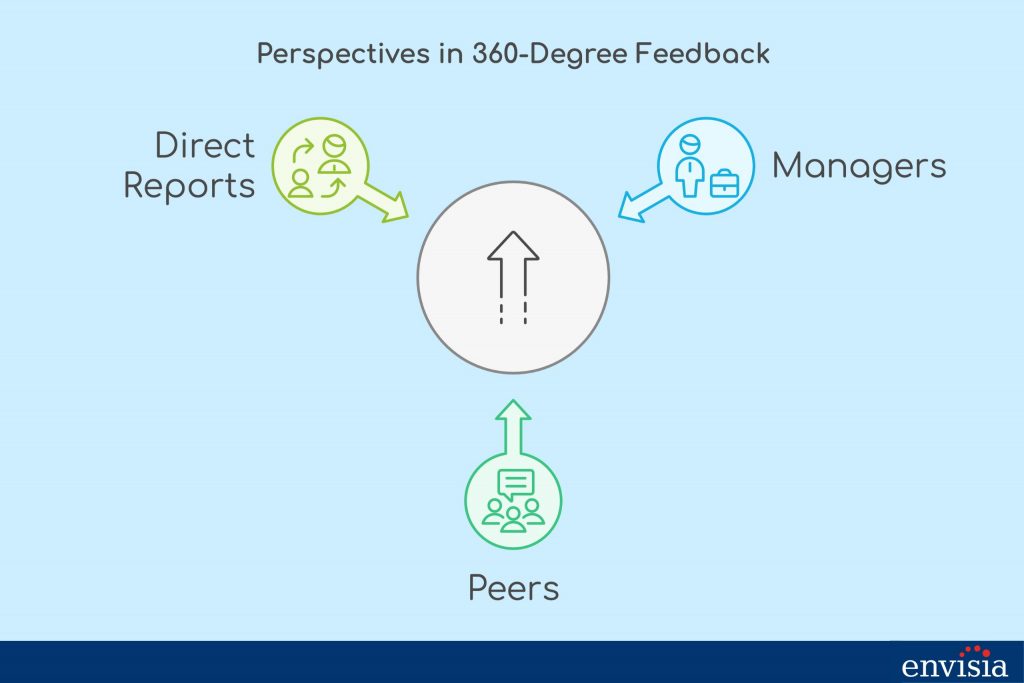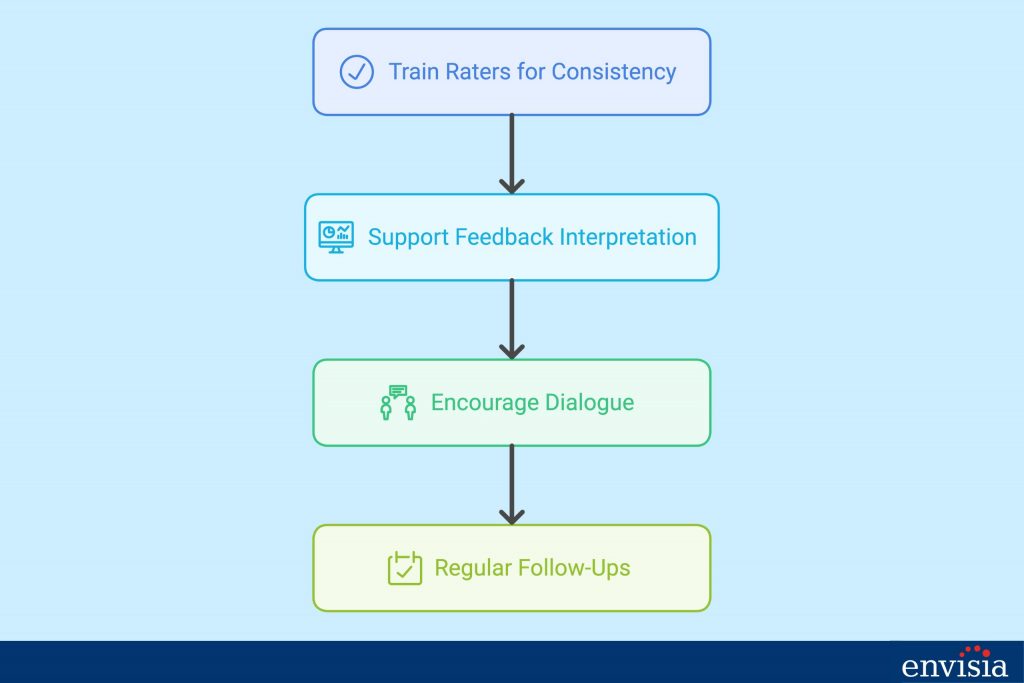In the world of 360-degree feedback, one pressing question arises: should raters agree in 360 feedback, or is variability a strength? This presents an intriguing challenge, as organizations strive to balance comprehensive performance insights with the inevitable diversity of opinions.
You’ll discover here that rater disagreement isn’t a flaw but a feature. It’s a signal of rich, multi-faceted perspectives that, when harnessed effectively, can elevate both individual and organizational development. This blog delves deeper into the causes, benefits, and strategies for leveraging these diverse viewpoints, providing actionable insights for HR professionals and leaders alike. Let’s explore why varying perspectives matter and how to maximize their value.

The Nature of Rater Disagreement
Disagreement among rater groups is not only expected but also valuable in 360-degree feedback. Each rater group—managers, peers, direct reports, and even self-raters—observes the employee’s performance through a unique lens shaped by their interactions and expectations. These differences in perspective are inevitable and crucial for understanding the full spectrum of an employee’s capabilities.
Research by Hoffman, B. J., & Woehr, D. J. (2009) emphasizes that cross-source variability often reflects genuine differences in perspectives rather than flaws in rating quality. Understanding why raters agree or disagree in 360 feedback can help organizations better interpret these differences. For instance, a manager might view an employee’s ability to meet deadlines as a critical strength, while peers might prioritize collaboration and teamwork. These discrepancies provide a more nuanced picture of an individual’s performance, making the feedback process inherently richer.
Why This Matters
Rather than seeking absolute agreement, organizations should focus on understanding why perspectives differ. Are the discrepancies due to contextual performance, role-specific expectations, or perhaps varying standards of evaluation? These insights can guide more effective developmental conversations and foster greater self-awareness among employees.
Imagine an employee who excels at meeting deadlines but struggles with interpersonal communication. A manager’s feedback might highlight their efficiency, while peers might emphasize communication challenges. Together, these perspectives offer a balanced view of the employee’s strengths and growth areas, showcasing the richness of multi-source feedback.

Research Insights on Rater Agreement
Unlike traditional performance evaluations, 360-degree feedback does not rely on high interrater reliability as a cornerstone of validity. The goal isn’t to achieve consensus but to gather a broad spectrum of observations. This approach aligns with findings from Scullen, S. E., Mount, M. K., & Goff, M. (2000), who note that rating discrepancies often mirror legitimate performance variations across different contexts.
For instance, a manager might evaluate strategic thinking, while a peer focuses on collaboration skills. Such differences highlight the multifaceted nature of roles and responsibilities, underscoring the importance of interpreting ratings with context in mind. By valuing these contextual insights, organizations can avoid oversimplified assessments that fail to capture the complexity of real-world performance.
Core Insight
Variability in ratings isn’t necessarily “bias” or “error”—it’s a reflection of the dynamic environments in which employees operate. Understanding this can help organizations frame feedback constructively rather than defensively.
When reviewing feedback, consider the unique vantage points of each rater group. Managers might emphasize strategic contributions, while peers could focus on day-to-day collaboration. These varied insights, when analyzed together, often reveal complementary strengths and areas for growth that might otherwise go unnoticed.

Practical Implications of Rater Variability
The diversity of rater feedback offers a wealth of opportunities for targeted development. When multiple independent raters contribute insights, the collective feedback paints a more reliable picture of overall performance. As Murphy, K. R. (2008) highlights, pooling diverse ratings can enhance the accuracy and usefulness of feedback.
However, to fully leverage this variability, organizations must approach it with the right mindset. Viewing disagreement as an asset rather than a liability allows for more effective developmental planning. It also encourages employees to openly engage with feedback, fostering a growth and continuous improvement culture.
How to Leverage Rater Variability:
- Identify Patterns: Look for themes or recurring observations across groups. For example, if both peers and managers note a need for improved communication, this may be a key area for development.
- Contextualize Feedback: Understand how specific relationships or situations influence ratings. A direct report’s perspective on leadership might differ significantly from a peer’s view.
- Prioritize Development Areas: Use variability to pinpoint key strengths and areas for improvement. Diverse feedback ensures a well-rounded developmental focus.

Understanding and Addressing Rater Bias
One way to enrich the discussion around rater variability is by addressing potential biases that might influence feedback. Raters often bring subconscious preferences or workplace dynamics into their evaluations, which can skew the results. To mitigate this, organizations can focus on fostering a culture that minimizes bias and enhances objectivity in feedback. One approach is implementing bias awareness training, which equips raters with the ability to recognize and reduce subconscious preferences, such as favoritism or stereotyping. Additionally, ensuring feedback remains anonymous wherever possible can alleviate pressure and encourage genuine input. Finally, leveraging tools to cross-check ratings helps identify patterns or outliers that might suggest biases, creating a more balanced and actionable feedback process. By proactively addressing bias, organizations can ensure the feedback collected is as fair and balanced as possible, further enhancing its developmental value.
Strategies for Managing and Interpreting Rater Feedback
To maximize the value of 360-degree feedback, organizations need strategies to navigate and interpret the natural variability in ratings. Here are a few actionable steps:
- Train Raters for Consistency: Provide guidance on what constitutes constructive and unbiased feedback. Ensure raters understand the goals of the 360-degree process to minimize common pitfalls like leniency or halo effects. Training sessions can also help raters avoid overly personal or irrelevant feedback.
- Support Feedback Interpretation: Equip employees with tools and resources to make sense of diverse feedback. This could include coaching sessions, workshops, or digital platforms that aggregate and visualize feedback insights. Visualization tools, such as heat maps or trend graphs, can highlight patterns and outliers in the feedback.
- Encourage Dialogue: Facilitate discussions where employees can ask clarifying questions and explore the “why” behind differing viewpoints. This fosters a growth mindset and actionable takeaways. Open conversations also build trust and help employees view feedback as an opportunity rather than a critique.
- Regular Follow-Ups: Don’t let feedback discussions end after the initial review. Schedule follow-ups to assess progress and address any ongoing concerns. This demonstrates a commitment to development and keeps employees engaged in the process.

Conclusion
Rater disagreement in 360-degree feedback isn’t a challenge to be solved but a resource to be embraced. It reflects the complexity of performance and provides invaluable insights into how employees’ actions and behaviors are perceived across different contexts. By understanding and leveraging these varied perspectives, organizations can foster more meaningful developmental conversations and implement strategies that drive individual and team growth.
When approached thoughtfully, rater variability fosters deeper understanding, more targeted development plans, and better performance outcomes. Organizations that embrace this approach will be better equipped to navigate the complexities of modern workplaces. Ultimately, the question of whether raters should agree in 360 feedback highlights the value of diverse perspectives in fostering growth and development.
How well is your organization utilizing the diversity of perspectives in 360-degree feedback? If you’re ready to optimize your feedback systems, Envisia Learning can help. Contact us today to explore tailored solutions for your needs.
